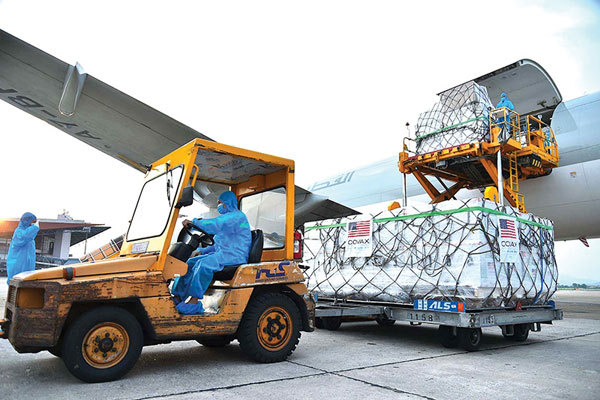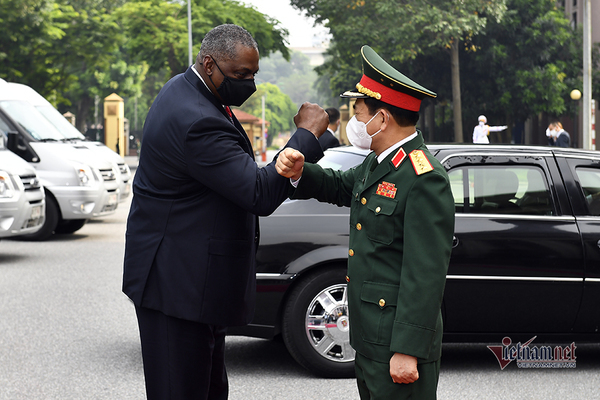in which Vietnam is staying on the US financiers’ rada, with a brighter outlook ahead.
 |
| Vietnam received a package of Moderna vaccines from the US via the COVAX mechanism on July 25. |
During the 8th US-ASEAN Summit last November, senior White House officials met with the leaders of ASEAN’s 10 member states to advance the US-ASEAN Strategic Partnership. Ever since, both sides have been working to boost economic recovery in the region amid the escalation of COVID-19.
The US International Development Finance Corporation (DFC) is actively investing in multiple sectors across Southeast Asia, with over $1 billion deployed to date. It has approved a $25 million investment to support a regional equity fund, which will invest in businesses introducing innovative technology in various Southeast Asian nations.
“These investments will help reduce costs for smaller enterprises, facilitate trade, and foster innovation,” said the US Embassy in Cambodia in a statement. “The DFC has committed to invest $40 million to help Frontiir [provider of affordable digital access and information services] expand broadband access for the people of Myanmar. Another $5 million project in Cambodia will extend financial services to underbanked populations.”
The DFC is one among many entities from the US that have been pushing up cooperation with ASEAN economies. Last October, the third Indo-Pacific Business Forum held in Hanoi brought together business and government leaders to spur economic innovation and collaboration. US firms inked more than $11 billion in commercial deals.
In April, the US-ASEAN Business Council brought a delegation of leading US companies to Hanoi as part of its fourth food and agriculture industry mission to Vietnam. The delegation met with government officials and stakeholders in the sector to discuss how US businesses could support Vietnam’s post-pandemic recovery and learn the priorities of Vietnam’s government and their plans for the agriculture sector under the new leadership term of 2021-2026.
“The business relationship between the US and Vietnam continues to be dynamic. According to the United States Foreign Agriculture Service, US exports totalled $3.4 billion in the fiscal year 2020. Vietnam is also ranked as the US’ seventh-largest agricultural export market,” said the council’s senior vice president and regional managing director Michael W. Michalak. “Our annual mission constitutes a key part of our continued engagement, and our members remain committed to the long-term development of Vietnam’s food security, safety, and sustainability.”
|
Bui Thanh Son - Minister of Foreign Affairs Consistent with the foreign policy of independence, self-reliance, multilateralisation, diversification, and respect for the principles, manners, and identity of ASEAN, Vietnam seriously implements the commitments and obligations of a member, with many important contributions to strengthening solidarity, building the ASEAN Community, and realising its Vision 2025. With the motto of being proactive, positive, responsible, and persevering in ASEAN’s principles, Vietnam works with member countries to make efforts to bring the ASEAN ship to weather the storm, proactively responding and adapting to the current situation, maintaining the momentum of regional cooperation and connectivity, and reaffirming the central role and enhancing the position of ASEAN. Many important initiatives in 2020 have become common assets of ASEAN such as the COVID-19 Response Fund, the Regional Reserve of Medical Supplies for Public Health Emergencies, and the Comprehensive Recovery Framework. Implementing the foreign policy of the 13th Party Congress, with the country’s new strength after 35 years of economic integration, Vietnam continues to actively work with ASEAN to build a united, strong, and stable community, with ASEAN’s central role in the regional security architecture. It is necessary to increase innovation in participating in ASEAN to better promote its role, identity, and strengths together with member countries, thereby bringing practical benefits to all members as well as partners inside and outside the region. With a proactive, positive, reliable, and responsible mindset, Vietnam will work with member countries to effectively implement cooperation initiatives and agreements, making practical contributions to solving common issues of the region. |
Focus on urgency
To expand its trade and investment with Vietnam and the region as a whole, through the ASEAN Single Window (ASW), the United States Agency for International Development has continued to work with the bloc to implement a self-certified system to expedite select traders in securing government certificates of origin to qualify for lower tariff rates.
“We have reached the first step of linking the ASW with the United States Customs and Border Protection’s Automated Commercial Environment to share electronic plant inspection certificates between ASEAN and the US,” read the statement.
Currently, around 90,000 documents are issued by ASEAN and the US each year, totalling about $13 billion of two-way trade revenue. Expansion of the ASW allows for increased intra-ASEAN trade and will eventually lead to streamlined trade with the US once both sides’ electronic commercial systems are linked.
Since early last year, the US and ASEAN have also been fostering their anti-pandemic cooperation.
“Our strategic partnership with ASEAN is focused on our most urgent challenges: fighting the COVID-19 pandemic and building a sustainable economic recovery,” said US Secretary of State Antony Blinken. “To date, the United States has provided over 23 million doses of vaccines to ASEAN members and over $158 million in emergency COVID-19 assistance.”
The US intends to provide an additional $500,000 to the ASEAN COVID-19 Response Fund initiated by Vietnam to support the purchase of even more life-saving vaccines. This builds on the US’ close work with ASEAN regional health authorities on an ASEAN Public Health Emergency Coordination System.
“This work builds on our already strong foundations: US foreign direct investment in ASEAN countries totalled $328.5 billion as of 2020, making the United States ASEAN’s largest source of investment. US exports from almost 42,000 companies across all 50 states support more than 625,000 US jobs,” Blinken added.
At a press conference on the results of the 37th ASEAN Summit held last November, then Prime Minister and now State President Nguyen Xuan Phuc said the continuous development of trade and investment between ASEAN and the US and economic cooperation “has become the basis of the long-term development of bilateral relations, including Vietnam and ASEAN countries.”
“ASEAN highly appreciates the strategic partnership with the US on the basis of mutual respect for independence and sovereignty, and wishes to build a peaceful and prosperous region,” he said. “The US is an important partner of ASEAN in supporting the training of its human resources, through many programmes and projects. Moreover, the US actively participates in efforts to narrow the development gap of ASEAN. I believe the partnership that has developed over the past four decades will continue to grow well.”
The US began engaging with ASEAN as a dialogue partner in 1977. Starting in the early 1990s, development cooperation increased dramatically through the launch of economic programmes focusing on trade and investment, technology transfer, and education.
“Southeast Asia is one of the fastest-growing and most dynamic regions in the world,” the United States Mission to ASEAN said on its website. “The US will remain a strong, reliable, and active partner in the region and is investing in public diplomacy, military, and assistance resources in a way that is commensurate with the US comprehensive engagement.”
Major eyes on Vietnam
US Vice President Kamala Harris will travel to Singapore and Vietnam on August 24-26 to strengthen relationships and expand economic cooperation with two critical Indo-Pacific partners of the United States. Furthering economic cooperation, with trade and investment discussions, will likely be high on the agenda. Earlier this year, Vietnam’s Deputy Prime Minister Pham Binh Minh held talks with US Secretary of State Blinken, in which both sides agreed bilateral ties have advanced in the last 25 years. They pledged to cooperate in deepening the ties “more comprehensively, with a focus on economy-trade-investment, overcoming war consequences, enhancing maritime capacity, fighting COVID-19, and adapting to climate change.”
Adam Sitkoff, executive director of the American Chamber of Commerce in Hanoi told VIR, “American companies are optimistic about business prospects in Vietnam and we support efforts to create a modern economy that will attract future investment and high-paying jobs for Vietnamese people.”
Statistics from Vietnam’s Ministry of Planning and Investment showed that as of July 20, US investors registered $9.68 billion in Vietnam for nearly 1,120 valid projects, making the US the 11th-largest foreign investor in the Southeast Asian nation. In the first seven months of 2021, the US ranked seventh in investment in Vietnam, with the total newly-registered capital of $415.7 million.
Source: VIR

Vietnam's position in US defense strategy in Southeast Asia
The US Secretary of Defense is on a trip to Singapore, Vietnam and the Philippines. This is the first visit to Southeast Asia by a top official in the Biden administration.
